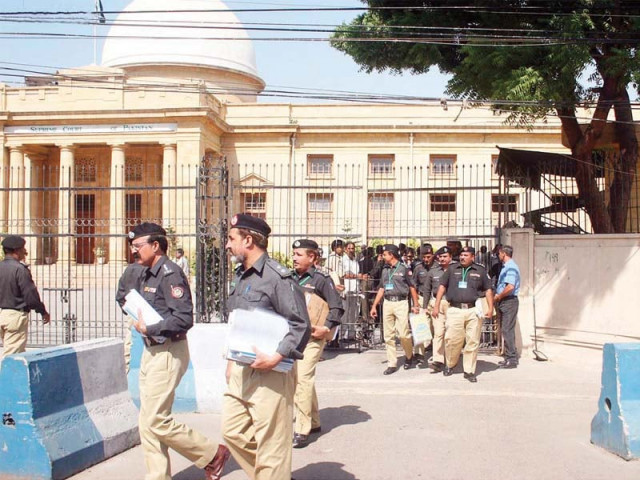Karachi violence: If the city is so safe, the IGP shouldn’t need an escort, says SC
On day one of the hearings, judges grill the administration over how far it was able to bring down the crime rate.

If the situation has improved so much, then the chief of police should make at least four visits around the city without protection, remarked Justice Gulzar Ahmed. “If the police officers [themselves] need escorts, then common citizens need more security,” he said.
The five-member bench, headed by Justice Anwar Zaheer Jamali, was assessing how far the SC’s recommendations had been followed after Karachi went through one of its bloodiest summers in 2011. The bench includes Justices Khilji Arif Hussain, Sarmad Jalal Osmany, Amir Hani Muslim and Gulzar Ahmed.
At the outset, Sindh Advocate General Abdul Fattah Malik submitted a report from IG Fayyaz Leghari, claiming that the law and order situation had remarkably improved because of action taken by the force. They had tracked down nearly 168 suspected target killers and a large number of illicit arms had been seized. Officers had even lost their lives in the line of duty.
But then, Justice Anwar Zaheer Jamali remarked: “Had the situation improved after the orders passed by the court, then there would be no need to hear this case. On the contrary, the crimes rate has gone up.”
Karachi is such a big city, replied AG Malik, thousands of people from all over the country come here. This includes criminals and foreigners. It is not easy to identify and track them down, he added.
Justice Gulzar Ahmed questioned what action the law enforcement agencies had taken to identify and arrest criminals. “If Karachi had become a floodgate for criminals, are the law enforcement agencies supposed to welcome them,” he asked.
Indeed, Justice Khilji Arif Hussain said: “Today the residents of Karachi feel so unsafe that they’re scared of leaving their homes. The children of officers might be safe, but the children of ordinary citizens are not.”
As an example of the absence of the writ of the law, the judges pointed out how a number of vehicles with Dubai number plates or simply Applied for Registration (AFR) were roaming around the city without anyone checking. “We have to apply the law,” stressed Justice Jamali.
De-limitation of areas
A change of government was the excuse the AG gave when it came to answering whether the administration had been able to alter the boundaries of Karachi’s administrative units, like police stations, to avoid the creation of no-go areas. The SC had ordered the same for different constituencies. He gave a long explanation on a ground survey which had to be shared with the crime branch and meetings that had not taken place.
“We are not interested at all in the paper work,” said Justice Jamali. “The fact is that no improvement has been made.”
Taking notice of the absence of Election Commission officers, the SC directed Malik to submit a map of city, clearly showing the dominance of political parties.
No-go areas
Major Ashfaq from the Pakistan Rangers, Sindh, submitted his report on what they had done with the police force to eliminate no-go areas, which he said don’t exist any more as far as the entry of any law enforcement agency was concerned. He admitted, however, that neighbourhood barriers had been put up but that didn’t mean they were no-go areas. If anyone complains, the Rangers will act.
Justice Anwar Zaheer Jamali observed, however, that “The whole of Karachi had turned into a no-go area for poor people, as [someone from one area] cannot enter another area after [dark].”
There was pin-drop silence as the judges went over their understanding of the actual situation. Justice Sarmad Jalal Osmany observed that people being killed in no-go areas were not falling prey to sectarian violence, but these were political killings. Who is responsible for them?
Action against police
officers
Deputy police chief Bashir Ahmed Memon, who appeared on behalf of the CCPO, focused on punishment for officers, who failed to control crime in their areas. Major penalties were imposed, some were demoted and others even suspended. Justice Amir Hani Muslim remarked that 80% of the SHOs in Karachi would go home, if indiscriminate action was taken against them.
All extortion cases had been addressed, AIG Memon went on to claim. Around 19 policemen and two officials each of Rangers and Frontier Constabulary had been killed in the line of duty. “We must appreciate them [the martyrs] because you have already been demoralised,” said Justice Gulzar Ahmed.
AIG Memon also disclosed that a man named Ghafoor Bugti had emerged as a big name in kidnapping for ransom.
Referring to a recent incident of extortionists killing sacrificial animals, Justice Hani added that people had even stopped entering the city to sell their animals because extortionists kill them.
“[We will only be satisfied] when people are safe; they’re going to college and school, they are opening their shops and doing their business,” he said. “Today, a person [doesn’t even know] whether he will return home alive or not.”
The hearing will continue today. The court said it expected the chief secretary and director-general of the Rangers, provincial election commission officers to be present.
Published in The Express Tribune, October 24th, 2012.



















COMMENTS
Comments are moderated and generally will be posted if they are on-topic and not abusive.
For more information, please see our Comments FAQ